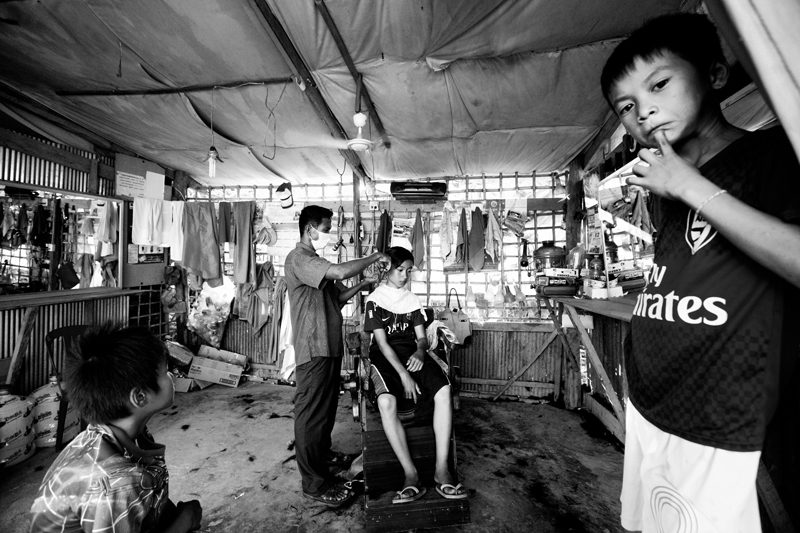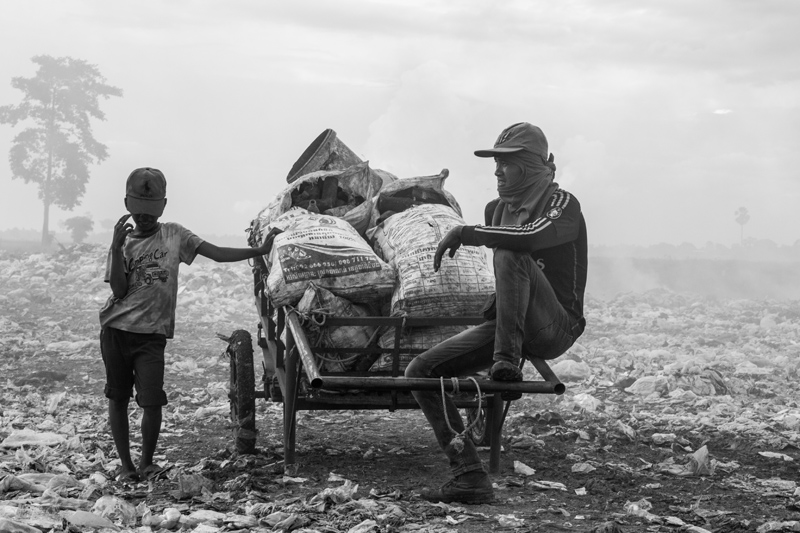The Maek Make Art Space, closed for two years as its artist-manager pursued an art residency in Thailand, has reopened this month in Battambang City with a renovated space and an exhibition that reflects a new approach to presenting Cambodian talent.
The gallery intends to give artists who have never previously exhibited an opportunity to put their work before a broad audience, which will grow with the addition of an online shop, said Terry Trethowan, who oversees the gallery.

“We’re looking into showcasing that raw talent of Battambang,” Mr. Trethowan said.
The relaunched Maek Make’s first exhibit is a series of black-and-white shots by aspiring photojournalist Phoeung Visal. Entitled “Surviving in Battambang,” it features ordinary Cambodians toiling to earn a living. The images range from children scavenging at a dump site and an artisan fashioning a knife blade to a fisherman spreading his net from his pirogue.
In addition to its better-known artists trained at the local art school of the NGO Phare Ponleu Selpak, Battambang has a number of people with natural talent and little or no formal training, Mr. Trethowan said.
“It’s hard for any artist to get his first exhibition,” he said. “Of course, an established artist is welcome to exhibit as well.”
Located on Street 2.5 off Battambang’s central market, Maek Make was opened in 2011 by Battambang artist Mao Soviet with Mr. Trethowan’s assistance. It temporarily closed when Mr. Soviet was awarded a Thai university artist-in-residence grant.

Since then, the upper-floor gallery was renovated and a local-craft shop set up at street level to help support the art space, Mr. Trethowan said.
Maek Make also plans to launch an online gallery.
“Battambang has a very strong reputation for its art, but it’s only accessible if you’re in Battambang,” he said. “In the 21th century, this should change.”
Since expatriates are still the main purchasers of the country’s contemporary art and the Battambang expat community is small, it is crucial to develop ways to reach potential buyers outside the city, he said.
As for showcasing Mr. Visal’s photographs for the reopening exhibition, Mr. Trethowan said he was drawn to both the photographer’s work and him as a person. “I was astonished when he said he wanted to be a photojournalist and go to Syria,” he said.
The lives of those remaining in Syria’s war-torn communities remind Mr. Visal of his own youth, when Khmer Rouge soldiers attacked his village on the outskirts of Battambang city in the early 1990s.
In Aleppo, for example, “people have lost their homes, lost their family, children have no school, they lost their hospital,” Mr. Visal said. “It’s hell.”
His childhood memories are filled with similar images. Born in 1988, he recalls shelling and assaults, with Khmer Rouge soldiers taking food and anything else they cared to steal. “It was a bitter life,” he said.
No one was there to record the events and broadcast them, said Mr. Visal, who is currently the director of Cambodia Cotton Club, a Battambang association helping farmers grow organic cotton on demined land and developing a line of products using their crops.
His experience fueled his desire to become a photojournalist so he could “show the world what is happening.”
Mr. Visal shot the photographs in the exhibit in black-and-white as he feels this better reflects life’s contrasts.
“Black and white, rich and poor, good and bad…everything comes in pairs,” he said.
His show at Maek Make gallery runs through January.




